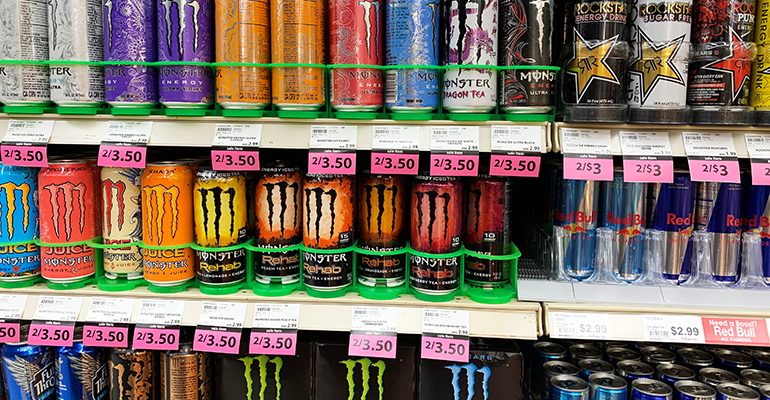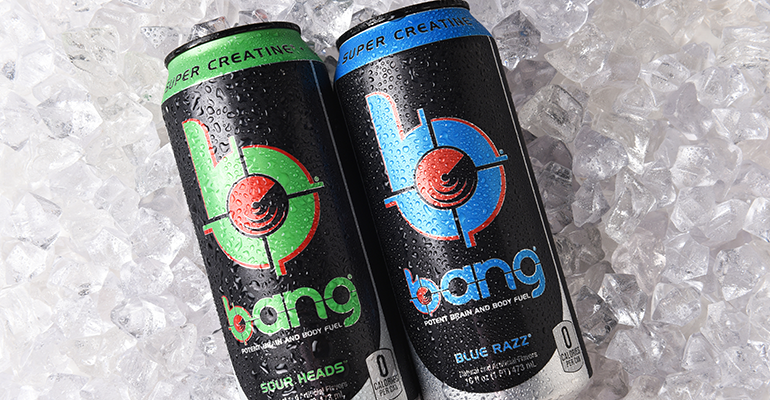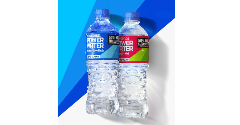News
US energy drinks market set for continued growth as shake up continues
12 Sep 2022
The lucrative US energy drinks market is set to reach $21 billion by 2026, as rapidly increasing demand for energy drinks leads to a continued shake-up of the CPG marketplace, say experts.
Rapid growth of the US energy drinks market is fuelling a ‘game of musical chairs’ between brands and distribution partners, warns Joshua Schall, owner and president of JS Consulting.

The United States energy drinks market was valued at $14.3 billion USD in 2020 and is forecast to hit $21 bn by 2026, with a compound annual growth rate (CAGR) of 6.9% predicted as consumer demand for healthy and functional energy continues to grow, according to a recent report by ResearchAndMarkets.
“It cannot be stated enough, just how important the energy category is – and will continue to be – within the beverage world,” said Schall in a recent video analysis on YouTube.
“Change is really the only constant in life, especially when we’re talking about the energy drinks category,” he noted. “I almost guarantee more large mergers and acquisitions will happen, that will inevitably cause further disruption to the category.”
Bang out, Celsius in: PepsiCo shifts focus
PepsiCo’s recent $550 million investment in fitness energy drinks company Celsius Holdings, as part of a deal that will see the PepsiCo gain 8.5% ownership of Celsius and forge a long-term strategic distribution arrangement, came just days after its previous distribution deal with Bang Energy came to an end.
In April 2020, Bang Energy entered into an exclusive distribution agreement with PepsiCo, which saw the Pepsi become the exclusive distributor for Bang in the US. However, the deal quickly turned sour, with Bang Energy owner Vital Pharmaceuticals Inc (VPX) filing a lawsuit that accused PepsiCo of intimidation tactics and of ‘gross misconduct’ in the distribution of Bang.
Bang Energy CEO Jack Owoc said all disputes with PepsiCo had been fully settled and resolved at the time that the deal ended.
“Our primary objective is to effectuate a smooth transition that best serves both Bang Energy’s and PepsiCo’s highly valued retail customers,” he added.
Schall added that after the announcement that PepsiCo and Bang Energy would end its partnership, it was clear that PepsiCo would need to seek another strategic partner or potential M&A transaction to fill its open energy drink slot within its distribution system.
He noted that Celsius was the most impactful and disruptive deal for PepsiCo and the wider energy drinks market, adding that the fact that Celsius is defined as being ‘healthy’ and ‘functional’ in the consumer mind means it is more differentiated than the other PepsiCo energy drink offerings.
“The fact is that the Celsius consumer does not cross over much with the Rockstar Energy or Mountain Dew Energy offerings,” he added. “That lessens cannibalisation risks that were more pronounced with Bang Energy.”
 © AdobeStock/Steve Cukrov
© AdobeStock/Steve Cukrov
Continued shake-up: GHOST Energy to benefit?
Schall also suggested that the deal between PepsiCo and Celsius will lead to an inevitable market shake-up with direct store delivery (DSD) partners, as they look to replace the Celsius brands being taken into the new deal.
Indeed, he predicts that the deal between PepsiCo and Celsius means that the company’s former distribution partner Bang Energy will have a somewhat easier time re-securing some of the original DSD partnerships it lost in 2020 when it entered into its now defunct agreement with PepsiCo, while C4 Energy and Alani Nu may also see further growth opportunities as DSD partners look to reshuffle offerings.
“Arguably the biggest indirect winner of the PepsiCo and Celsius Holdings deal is GHOST Energy,” said Schall, noting that a lot of DSD partners that Celsius will be forced to leave are part of AB InBev.
“AB InBev just so happens to be the joint venture partner on the GHOST Energy product,” he said, adding that GHOST has quickly become the fastest growing energy drink in the US market.
“With Celsius Holdings leaving those AB InBev DSD partners that were shared by both brands, even more attention and resources will be given to GHOST Energy,” he suggested.
Related news

Oat Barista: Innovation for game-changing beverages
20 Nov 2025
Oat Barista is a clean label, sustainable, and innovative drink base specifically designed to create the perfect foam in one single ingredient.
Read more
How younger consumers are redefining ingredient choices and rejecting brand loyalty
18 Nov 2025
Gen Z and millennial consumers’ preferences for transparency, functionality, and purpose are “redefining the very nature of consumption itself”, says SPINS.
Read more
Hybrid formats and flexible positioning to disrupt category norms in 2026
17 Nov 2025
Trend forecasters expect food and drink to move more fluidly across occasions, functions, and formats as consumers seek versatility, novelty, and convenience.
Read more
Danone highlights digestive health as potential ‘tipping point’ for food industry
13 Nov 2025
Danone is betting on a food industry “tipping point” that will bloat the market for healthy products, particularly those related to gut health.
Read more
New UPF standard hoped to offer consumers ‘coherence and clarity’
10 Nov 2025
Ingredients companies are being urged to enter “a new era of partnership and innovation” following the launch of the industry’s first non-UPF verification scheme.
Read more
Faravelli at Fi Europe: Showcasing FARA® functional solutions for food and nutra
28 Oct 2025
At Fi Europe 2025 in Paris (stand 72M39), Faravelli showcases FARA® Customized Functional Solutions and a wide ingredient portfolio for food and nutra – delivering quality, innovation, and expertise.
Read more
Agrigum Redefined FIBER
27 Oct 2025
Agrigum has transformed gum acacia into a natural, science-backed fibre that supports gut health, sustainability, and innovation across global food and nutrition applications.
Read more
Expanding boundaries in food & beverage innovation
23 Oct 2025
IMCD and FrieslandCampina Professional expand partnership to deliver Kievit® across EMEA, enabling brands to enhance quality and accelerate time-to-market for tomorrow’s food & beverage creations.
Read more
Amazon Grocery launch aims to balance quality with affordability
22 Oct 2025
Global e-commerce giant Amazon has introduced a new private-label food brand, combining existing Amazon Fresh and Happy Belly products with new everyday items.
Read more
Powerade enters hydration space with launch of Power Water
21 Oct 2025
Coca-Cola’s Powerade brand has launched a zero-sugar, electrolyte-enhanced functional water, marking the brand's entry into the hydration space.
Read more